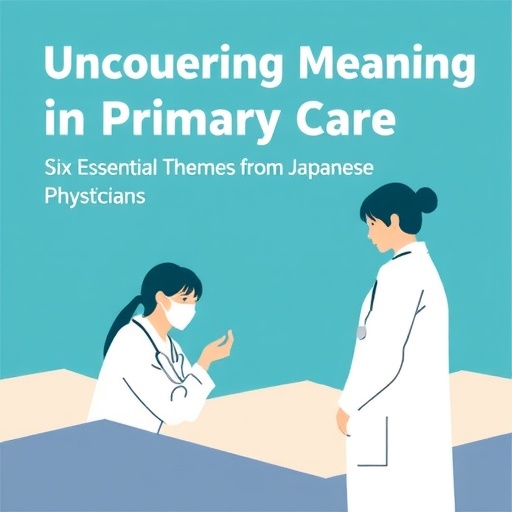In the context of Japan’s swiftly aging population coupled with one of the world’s lowest birth rates, the role of primary care physicians has become increasingly fundamental. Unlike specialists who concentrate primarily on distinct organs or systems, primary care physicians—commonly termed family physicians or general practitioners—adopt a holistic approach, addressing the multifaceted health issues of patients in a comprehensive manner. However, Japan’s delayed recognition of primary care as an independent medical specialty has presented challenges for these physicians. A significant number express uncertainty in defining their professional identity, exacerbated by the absence of established role models or standardized career pathways within this field.
This emerging uncertainty has prompted a dedicated team of researchers in Tsukuba to engage in qualitative investigations aimed at dissecting the meaningful experiences that these physicians derive from their work. Through extensive interviews, the research delved into the nuanced, multifarious dimensions of their professional lives, seeking to capture insights that transcend mere clinical functions. The resulting analysis distilled six pivotal themes that constitute core sources of professional meaning for Japanese primary care physicians, illuminating how they navigate complex healthcare landscapes.
The first theme highlights the challenge and satisfaction embedded in managing a vast array of health problems across patient demographics. Unlike specialists restricted to narrow fields, primary care physicians operate at the confluence of diverse medical domains. This integrative role demands exceptional diagnostic acumen, adaptability, and an ongoing commitment to broad-based medical knowledge. Physicians find value in tackling these diverse issues as it fosters continual intellectual engagement and clinical creativity, reinforcing their professional growth.
Connected deeply to this is the second theme—the adoption of a comprehensive approach not only to physical ailments but also to psychological and social challenges affecting both patients and their families. Primary care physicians often serve as the initial point of contact, bridging gaps between fragmented services and coordinating holistic care pathways. This comprehensive care model acknowledges that health is not merely an absence of disease but a complex interplay of biopsychosocial factors, and physicians derive profound meaning in managing this complexity.
The third theme revolves around the cultivation of rapport through continuous, longitudinal care. Japanese primary care physicians emphasize sustained patient relationships, which foster trust, empathy, and nuanced understanding of individuals’ evolving health trajectories. This continuity of care enables early detection of health issues, personalized intervention strategies, and enriched patient satisfaction. Such enduring connections create a deeply rewarding professional experience, anchoring physicians’ sense of purpose.
Interdisciplinary collaboration emerges as the fourth significant theme. Primary care physicians frequently coordinate with other healthcare professionals—nurses, specialists, social workers, and allied health providers—to address the complex needs of their patients. This teamwork ensures that care is not only medically appropriate but also extends support for mental health, rehabilitation, and social welfare. Physicians feel a sense of fulfillment in facilitating these collaborative efforts that optimize patient outcomes in ways unattainable by solitary practice.
The fifth theme delves into the educational contributions made by primary care physicians. Many engage actively in the training and mentorship of medical students, residents, and various healthcare providers. Through educating future practitioners, they translate experiential knowledge into pedagogical frameworks, shaping the next generation of physicians who will carry forward holistic primary care practices. This commitment to education enriches their professional identity and contributes to the sustainability of the specialty.
Finally, the study highlights the profound impact these physicians have on their communities and societal health. Primary care physicians often serve as advocates and leaders within their local contexts, promoting public health initiatives, preventive care, and health literacy. Their broad engagement goes beyond individual patients to encompass community wellbeing, reflecting a socially accountable model of medicine. This expansive influence reinforces their sense of meaning by aligning medical practice with broader societal goals.
Taken together, these themes suggest that meaningful work experiences for Japanese primary care physicians are intrinsically linked to encounters that facilitate professional development and enable contributions beyond clinical service alone. Experiencing growth through managing diverse challenges, forging sustained patient bonds, collaborating effectively, educating future professionals, and engaging with community health strengthens physician resilience and satisfaction. Such experiences form the bedrock of fulfilling and sustainable careers in primary care, an aspect that has been underrecognized in the Japanese healthcare system.
This research carries implications beyond Japan’s borders. Globally, many healthcare systems confront similar challenges—with an aging citizenry, increasing chronic diseases, and the need to integrate social determinants of health within medical care. Understanding how primary care physicians derive professional meaning points to potential strategies for bolstering workforce retention and enhancing care quality internationally. Tailoring support mechanisms and educational curricula to these identified themes could create stronger professional identities and reduce burnout.
Moreover, the study sheds light on the critical need for formal recognition and structural support of primary care specialties within Japan. As primary care continues its transition into a recognized specialty, policy initiatives should consider how to embed these meaningful elements into training and practice frameworks. Recognizing and reinforcing the intrinsic rewards identified can empower physicians, ensuring that primary care attracts and retains talented practitioners capable of meeting complex demographic and epidemiological demands.
In conclusion, by elucidating what makes work meaningful for Japanese primary care physicians, this qualitative study offers novel insights into the lived realities of these clinicians at the frontline of healthcare. The six thematic pillars uncovered—diverse clinical management, comprehensive patient-centered approaches, longitudinal relationships, interdisciplinary collaboration, educative roles, and societal engagement—form a blueprint for fostering professional fulfillment. Emphasizing these dimensions in policy, education, and practice reform holds promise in developing a resilient primary care workforce poised to address contemporary and future healthcare challenges.
Subject of Research: Meaningful work experiences and professional identity of certified primary care physicians in Japan.
Article Title: Meaningful work experiences of certified primary care physicians in Japan: a qualitative study.
News Publication Date: 28-Oct-2025.
Web References: https://doi.org/10.1186/s12875-025-03026-2
Keywords: Family medicine, primary care, professional identity, holistic care, Japan, medical education, interdisciplinary collaboration, community health.




